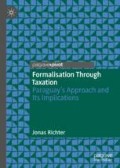Abstract
Using different quantitative variables together with the various interview accounts, this chapter shows that Paraguay’s economy is experiencing a formalisation process and that this formalisation surge cannot be explained by economic growth alone. It argues that the implementation of the deductible-personal income tax in 2012 led to a “change in culture” of market participants. This “change in culture” relates to a formalisation of market transactions, illustrated by a surge in officially documented purchases and rising value added- and firms’ corporate income tax contributions. It thus shows how the Paraguayan tax system nudges the final consumer to assists authorities in the formalising process.
Access this chapter
Tax calculation will be finalised at checkout
Purchases are for personal use only
Notes
- 1.
The VAT compliance gap is estimated using potential VAT collection and actual collection. Potential collection is defined as the summation of actual collection and the extended compliance gap. The latter is the sum of the payment gap (late payments and default) and the voluntary or involuntary compliance gap (evasion, avoidance, and crime). It is calculated by national account data of either household consumption or the gross value of production and intermediate consumption, minus tax expenses, which yields the theoretical tax base. The theoretical tax base times the effective tax rate gives the potential collection figure. Thus, the corresponding compliance gap is the difference between the potential collection and actual collection (see: Pecho and Jorratt 2016).
- 2.
The figures of the 2010 household survey data correspond to a total of 7857 observations gathered throughout the country and the responses for the 2018 data to 6650 observations. The percentages are geographically weighted.
- 3.
The country-level informality data is based on Medina and Schneider’s (2017) informality estimates.
- 4.
Soybean net exports accumulated to 34%, corn net exports to 4%, and beef net exports to 14% of total net exports (Atlas 2017).
- 5.
Dr Dionisio Borda was Paraguay’s finance minister who implemented the 2004 reform.
References
Alm, J., Martinez-Vazquez, J., & Schneider, F. (2004). Sizing’ the problem of the hard-to-tax. Contributions to Economic Analysis, 268, 11–75.
Atlas. (2017). The atlas of economic complexity. Growth Lab @ Center for International Development at Harvard University. Retrieved from: http://atlas.cid.harvard.edu/rankings
Becker, K. F. (2004). The informal economy. Stockholm: Swedish International Development Agency.
Berry, A. (2017). Losing ground in the employment challenge: The case of Paraguay. London: Routledge.
Cardozo, M. L., Salas, D., Ferreira, I., Mereles, T., & Rodríguez, L. (2016). Soy expansion and the absent state. Indigenous and peasant livelihood options in eastern Paraguay. Journal of Latin American Geography, 15(3), 87–104.
De Soto, H. (1989). The other path. New York: Harper & Row.
De Soto, H. (2001). The mystery of capital: Why capitalism triumphs in the west and fails everywhere else. London: Black Swan.
Elgert, L. (2016). More soy on fewer farms’ in Paraguay: Challenging neoliberal agriculture’s claims to sustainability. The Journal of Peasant Studies, 43(2), 537–561.
EPH. (2019). Encuesta Permanente de Hogares. Dirección General de Estadística, Encuestas y Censos de Paraguay. Available at: https://www.dgeec.gov.py
Garzón, H. (2007). Paraguay: La brecha de Evasión del IVA. Formalización de las actividades económicas. Programa Umbral.
Ishengoma, E. K., & Kappel, R. T. (2006). Economic growth and poverty: Does formalisation of informal enterprises matter? (GIGA Working Paper Series, GIGA-WP-20/2006).
ITC. (2015). Examples of successful DRM reforms and the role of international co- operation. Discussion paper. Eschborn, Germany: Deutsche Gesellschaft für Internationale Zusammenarbeit (GIZ).
Koehler-Geib, F., & Hnatkovska, V. (2015). Business cycles accounting for Paraguay (Policy Research Working Paper Series 7284). Washington, DC: The World Bank.
La Porta, R., & Shleifer, A. (2014). Informality and development. Journal of Economic Perspectives, 28(3), 109–126.
London, T., & Hart, S. L. (2004). Reinventing strategies for emerging markets: Beyond the transnational model. Journal of International Business Studies, 35(5), 350–370.
MacroTrends. (2017). Commodity prices. Retrieved from: http://www.macrotrends.net/charts/commodities
Maloney, W. F. (2004). Informality revisited. World Development, 32(7), 1159–1178.
McMillan, M. S., & Rodrik, D. (2011). Globalization, structural change and productivity growth (National Bureau of Economic Research No. w17143).
Nwabuzor, A. (2005). Corruption and development: New initiatives in economic openness and strengthened rule of law. Journal of Business Ethics, 59(1–2), 121–138.
Pecho, M., & Jorratt, M. (2016). Estimación de la brecha de cumplimiento del IVA en Paraguay. Panama City: CIAT.
Perry, G., Maloney, W., Arias, O., Fajnzylber, P., Mason, A., & Saavedra-Chanduvi, J. (2007). Informality: Exit and inclusion. Washington, DC: World Bank.
SET. (2017). Sistema de gestión tributaria Marangatu: Datos fiscales. Asuncion, Paraguay: Subsecretariá de Estado de Tributación.
Sinha, A. (2010). Global meltdown and informality: An economy-wide analysis for India – Policy research brief. In A. Bauer & M. Thant (Eds.), Poverty and sustainable development in Asia: Impacts and responses to the global economic crisis. Mandaluyong: Asian Development Bank.
Turzi, M. (2016). The political economy of agricultural booms: Managing soybean production in Argentina, Brazil, and Paraguay. Cham: Springer.
Williams, C. C. (2014). Out of the shadows: A classification of economies by the size and character of their informal sector. Work, Employment and Society, 28(5), 735–753.
World Bank. (2017). World development indicators. Retrieved from http://databank.worldbank.org/data/
World Bank. (2018a). Enterprise survey. Retrieved from http://www.enterprisesurveys.org/methodology
World Bank. (2018b). Paraguay overview. Retrieved from http://www.worldbank.org/en/country/paraguay/overview
Author information
Authors and Affiliations
Corresponding author
Rights and permissions
Copyright information
© 2019 The Author(s)
About this chapter
Cite this chapter
Richter, J. (2019). A Formalising Economy. In: Formalisation Through Taxation. Palgrave Pivot, Cham. https://doi.org/10.1007/978-3-030-29282-9_5
Download citation
DOI: https://doi.org/10.1007/978-3-030-29282-9_5
Published:
Publisher Name: Palgrave Pivot, Cham
Print ISBN: 978-3-030-29281-2
Online ISBN: 978-3-030-29282-9
eBook Packages: Economics and FinanceEconomics and Finance (R0)

